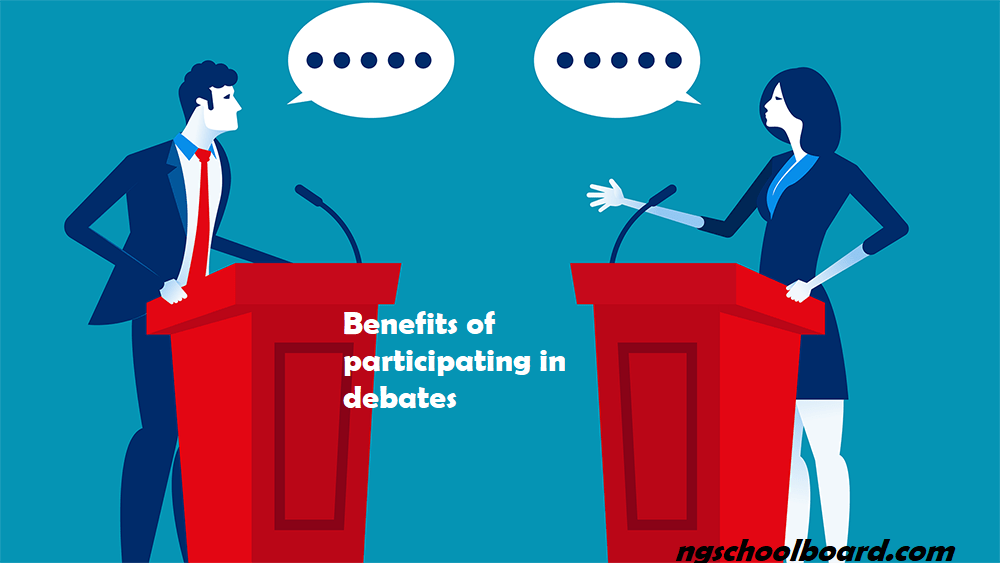Debates are a common and valuable form of communication, providing a platform for people to express and defend their opinions.
However, debates can become contentious, leading to increased tension and frustration. dictionary
Knowing how to end a debate is a crucial skill that can help to maintain healthy relationships and prevent conflicts from escalating.
In this blog post, we will explore practical tips for ending a debate in a respectful and productive manner.
Whether you are debating with a friend, or coworker, or in a group setting, these tips can help you to navigate difficult conversations with ease and confidence. (if you missed our previous post on Top Best 50 Debate Topics for Secondary Schools in Nigeria, do well to read it.)
Click to search for the best creche near me now

Explanation of what a debate is
A debate is a formal or informal discussion where individuals or groups present arguments and counter-arguments on a specific topic or issue.
The purpose of a debate is to persuade others to accept or reject a particular point of view, and it often involves presenting evidence, logical reasoning, and critical thinking.
Debates can occur in various settings, such as classrooms, political campaigns, business meetings, or social gatherings.
They can also cover a wide range of topics, from politics and social issues to scientific research and philosophical concepts.
Debates can be a powerful tool for expanding knowledge and promoting understanding, but they can also become heated and emotional if not conducted in a respectful and constructive manner.
Click to search for the best primary school near me now
Importance of knowing how to end a debate

Knowing how to end a debate is essential for several reasons. Firstly, debates can often become contentious, leading to negative emotions and strained relationships. By ending a debate on a positive note, you can maintain a respectful and amicable relationship with the person you were debating with, even if you don’t agree with their position.
Secondly, ending a debate can help to prevent conflicts from escalating into more significant problems.
If a debate continues without resolution, it can lead to frustration, resentment, and even anger.
By effectively concluding a debate, you can prevent these negative emotions from escalating into more significant conflicts that may be difficult to resolve.
Finally, knowing how to end a debate can help you to hone your communication and critical thinking skills.
By practicing effective debate techniques, you can learn to articulate your position more effectively, listen actively to opposing viewpoints, and find common ground with others.
These skills are essential not just in debates but in all areas of life, including personal relationships, work environments, and social interactions.
Click to search for the best Nursery school near me now
A brief overview of tips for ending a debate
Here is a brief overview of some practical tips for ending a debate in a respectful and productive manner:
- Set clear rules and expectations: Establish clear guidelines for the debate and ensure that everyone understands what is expected of them.
- Listen actively: Listen carefully to the other person’s arguments and try to understand their perspective without interrupting or dismissing their points.
- Identify common ground: Look for areas where you and the other person may agree, and use these points of agreement as a foundation for finding a resolution.
- Stay focused on the topic: Avoid getting sidetracked by irrelevant or emotionally charged issues. Stay focused on the primary topic of the debate.
- Use facts and evidence: Support your arguments with credible sources and facts, and encourage the other person to do the same.
- Be willing to compromise: Recognize that compromise is often necessary for reaching a resolution and finding common ground.
- End on a positive note: Conclude the debate with a positive statement or expression of appreciation, even if you do not agree with the other person’s position.
By following these tips, you can effectively end a debate in a way that respects both your own and the other person’s viewpoints, reduces tension and conflict, and fosters productive and respectful communication.
See Top Best 50 Debate Topics for Secondary Schools in Nigeria
Set clear rules and expectations

One of the most important steps in ending a debate is to set clear rules and expectations from the outset.
This can help to ensure that the discussion remains respectful, productive, and focused on the topic at hand. Here are some tips for setting clear rules and expectations for a debate:
- Establish the purpose of the debate: Make sure that everyone understands the goal of the debate and what you hope to achieve.
- Determine the format: Decide on the format of the debate, such as a structured or informal discussion, and ensure that everyone understands the format.
- Set time limits: Agree on the length of the debate and set time limits for each speaker to ensure that everyone has a fair opportunity to present their arguments.
- Agree on the ground rules: Establish ground rules for the debate, such as taking turns to speak, avoiding personal attacks, and maintaining a respectful tone.
- Choose a moderator: Consider having a neutral third-party moderator to keep the discussion on track and ensure that everyone follows the established rules.
By setting clear rules and expectations, you can help to create a productive and respectful debate environment where everyone feels comfortable expressing their views.
This can help to reduce tension and ensure that the debate remains focused on the topic at hand.
Importance of setting rules and expectations
Setting clear rules and expectations is essential for several reasons when it comes to debates. Here are a few reasons why:
- Establishing a common understanding: By setting rules and expectations, everyone involved in the debate can have a clear understanding of what is expected of them. This can help to ensure that the discussion remains on track, productive, and respectful.
- Creating a fair and balanced debate: Setting time limits, ground rules, and choosing a moderator can ensure that everyone has a fair opportunity to express their views and that no one dominates the conversation or monopolizes the discussion.
- Maintaining a respectful and productive environment: Clear rules and expectations can help to create a respectful and productive environment for debate, where everyone feels comfortable expressing their views and listening to others’ perspectives. This can help to reduce tension and prevent the discussion from becoming personal or hostile.
- Encouraging effective communication: By setting clear expectations, the debate can encourage effective communication, critical thinking, and active listening. This can help to promote understanding, foster mutual respect, and lead to a more productive discussion.
Overall, setting clear rules and expectations is essential for creating a productive, respectful, and fair debate environment.
By establishing guidelines and expectations, you can help to ensure that the discussion remains focused on the topic at hand, promotes effective communication, and leads to a positive outcome.
Examples of guidelines to set
Here are some examples of guidelines that you can set to ensure a productive and respectful debate:
- Respectful language: Ensure that all participants use respectful language and avoid personal attacks. Encourage them to focus on the issues and ideas rather than attacking individuals.
- Listening actively: Encourage all participants to listen actively and carefully to each other’s arguments. Ask them to avoid interrupting each other and to acknowledge the points made by others.
- Time limits: Set time limits for each speaker to ensure that everyone has an opportunity to express their views. This can also help to keep the debate on track and prevent it from dragging on for too long.
- Sticking to the topic: Encourage all participants to stick to the topic at hand and avoid getting sidetracked by irrelevant issues or tangents.
- Use of evidence: Encourage all participants to use credible sources and evidence to support their arguments.
- Avoiding assumptions: Encourage all participants to avoid making assumptions about others’ viewpoints and instead seek to understand their perspectives.
- Agreeing on the outcome: Agree on the desired outcome of the debate beforehand, such as reaching a compromise or finding common ground.
By setting guidelines like these, you can create a productive and respectful debate environment where everyone feels comfortable expressing their views and listening to others.
These guidelines can help to reduce tension, ensure that the discussion remains focused on the topic at hand, and lead to a positive outcome.
See How To Conduct Debate Competition
How setting rules and expectations can reduce tension
Setting rules and expectations can reduce tension in a debate in several ways:
- Promoting clarity: By setting clear guidelines, all participants will have a clear understanding of what is expected of them. This can help to reduce misunderstandings and prevent any unnecessary tension that may arise due to a lack of clarity.
- Encouraging mutual respect: When the ground rules are established, they promote an atmosphere of mutual respect. This means that each participant is aware of the other’s boundaries and limitations, and they will act accordingly. It can help to prevent personal attacks and create a more amicable environment for discussion.
- Focusing on the issues: Setting expectations for the debate helps to ensure that everyone focuses on the issues being discussed. This reduces the likelihood of personal attacks, and it prevents the debate from becoming derailed by irrelevant topics.
- Reducing ambiguity: By setting expectations, there will be less ambiguity about what the participants are supposed to do, say, or contribute. This clarity can help to reduce tension by giving everyone a sense of purpose and direction.
Overall, setting rules and expectations for a debate can reduce tension by promoting clarity, mutual respect, and focus.
These guidelines can help to create an environment where everyone feels comfortable expressing their views, and where the discussion remains productive and respectful.
Listen actively

Active listening is an essential aspect of ending a debate. Here’s how active listening can help you bring a debate to a productive close:
- Demonstrate respect: When you actively listen to someone, you show that you respect their opinion, even if you don’t necessarily agree with it. This can help to reduce tension and promote a more respectful debate.
- Gain understanding: Active listening helps you gain a better understanding of the other person’s point of view. This can help you to identify common ground and areas of agreement, which can help to bring the debate to a close.
- Reframe the debate: When you actively listen, you can also reframe the debate to focus on the underlying issues or concerns. This can help to bring the debate to a more productive conclusion and identify solutions that address the underlying problems.
- Encourage others: When you actively listen, you can encourage others to do the same. This can help to promote a more respectful and productive debate where everyone feels heard and valued.
Overall, active listening is an essential tool for ending a debate. It can help to reduce tension, promote understanding, and identify common ground. By actively listening, you can help to bring the debate to a close and find a productive way forward.
Explanation of active listening
Active listening is a technique that involves fully concentrating on what someone is saying and showing that you understand their point of view.
It’s more than just hearing what someone is saying – it’s about being fully present at the moment and giving the speaker your undivided attention.
Here are some ways to actively listen during a debate:
- Focus on the speaker: Give the speaker your full attention. Avoid distractions like your phone, computer, or other people in the room.
- Don’t interrupt: Allow the speaker to finish their point before responding. Interrupting can derail the conversation and make the speaker feel unheard or disrespected.
- Show interest: Show the speaker that you are interested in what they have to say. Make eye contact, nod, and ask follow-up questions to show that you understand their perspective.
- Paraphrase: Summarize what the speaker has said in your own words to ensure that you have understood their point correctly. This also shows the speaker that you are actively engaged in the conversation.
- Reflect on your own response: Take a moment to reflect on your own response before speaking. This can help you to respond in a more thoughtful and respectful manner.
Active listening can help to promote a more respectful and productive debate environment. By fully engaging in the conversation and showing that you understand the other person’s perspective, you can reduce tension and find common ground.
Benefits of active listening
Active listening has several benefits that can help in various situations, including debates. Here are some of the benefits of active listening:
- Builds rapport and trust: Active listening can help to build rapport and trust between individuals by showing that you value their opinions and are interested in their perspectives.
- Improves communication: Active listening can help to improve communication by reducing misunderstandings and promoting a clearer understanding of the issues at hand.
- Increases understanding: Active listening can help to increase understanding by allowing you to gain insight into the other person’s point of view and identify areas of agreement.
- Reduces conflict: Active listening can help to reduce conflict by promoting mutual respect and understanding. It can also help to de-escalate tense situations and find common ground.
- Promotes empathy: Active listening can help to promote empathy by allowing you to see things from the other person’s perspective. This can help to build stronger relationships and resolve conflicts more effectively.
Overall, active listening is a valuable skill that can help to improve communication, build relationships, and reduce conflict.
It is an essential tool for anyone who wants to end a debate in a productive and respectful manner.
Tips for practicing active listening during a debate
Here are some tips for practicing active listening during a debate:
- Stay focused: Focus your attention solely on the speaker and what they are saying. Avoid distractions like your phone, computer, or other people in the room.
- Avoid interrupting: Let the speaker finish their point before you respond. Interrupting can derail the conversation and make the speaker feel disrespected.
- Show interest: Show the speaker that you are interested in what they have to say by making eye contact, nodding, and asking follow-up questions.
- Paraphrase: Summarize what the speaker has said in your own words to ensure that you have understood their point correctly. This also shows the speaker that you are actively engaged in the conversation.
- Clarify: If you don’t understand something the speaker has said, ask for clarification. This can help to prevent misunderstandings and promote a clearer understanding of the issues.
- Stay neutral: Avoid making judgments or reacting emotionally to what the speaker is saying. Instead, try to stay neutral and objective.
- Reflect on your own response: Take a moment to reflect on your own response before speaking. This can help you to respond in a more thoughtful and respectful manner.
By practicing active listening, you can improve communication, build trust, and reduce conflict during a debate. It’s a valuable skill that can help you to bring a debate to a productive close and find common ground.
Identify common ground

Identifying common ground is an important step in ending a debate because it helps to find areas of agreement between the parties involved.
Here are some tips for identifying common ground during a debate:
- Listen for common interests: Listen for common interests, values, or goals that you share with the other party. This can help you to find common ground and build a shared understanding of the issues.
- Focus on underlying needs: Focus on the underlying needs or motivations that are driving the debate. By understanding these needs, you can find common ground and identify solutions that meet the needs of both parties.
- Look for compromise: Look for areas where you can compromise to find a solution that works for both parties. This can involve finding a middle ground or making concessions on certain issues.
- Identify shared values: Identify shared values that both parties hold. This can help you to find common ground and build a shared understanding of the issues.
- Find a common language: Try to find a common language that both parties can use to describe the issues. This can help to reduce misunderstandings and promote a clearer understanding of the issues.
By identifying common ground, you can find areas of agreement and work towards a solution that meets the needs of both parties. This can help to end the debate in a productive and respectful manner.
Explanation of why identifying common ground is important
Identifying common ground is important during a debate because it helps to build mutual understanding and find areas of agreement between the parties involved. Here are some reasons why identifying common ground is important:
- Builds trust: By finding areas of agreement, you can build trust and establish a foundation for future collaboration. This can help to reduce tension and promote a more productive debate.
- Encourages collaboration: Identifying common ground can encourage collaboration and a shared sense of purpose. This can help to promote a more positive and productive debate.
- Reduces conflict: By finding areas of agreement, you can reduce conflict and promote a more constructive conversation. This can help to prevent the debate from becoming heated or unproductive.
- Increases understanding: Identifying common ground can help to increase understanding and build a shared understanding of the issues at hand. This can help to promote a more productive debate and lead to more effective solutions.
- Encourages creative problem-solving: By finding common ground, you can encourage creative problem-solving and identify solutions that meet the needs of both parties. This can help to end the debate in a productive and mutually beneficial manner.
Overall, identifying common ground is an important step in ending a debate because it helps to build mutual understanding, reduce conflict, and promote a more positive and productive conversation.
Examples of areas where common ground may exist
Here are some examples of areas where common ground may exist during a debate:
- Shared values: Even if parties disagree on specific issues, they may share underlying values such as fairness, justice, or equality. Identifying these shared values can help to find common ground and build a shared understanding of the issues.
- Common goals: Parties may have different ideas about how to achieve a common goal, but they may agree on the importance of the goal itself. Identifying these common goals can help to find common ground and promote a more productive debate.
- Facts: Parties may disagree on the interpretation of facts, but they may agree on the facts themselves. Identifying areas of agreement around facts can help to build a shared understanding of the issues and promote a more constructive debate.
- Priorities: Parties may have different priorities or preferences, but they may agree on the importance of certain issues or concerns. Identifying these shared priorities can help to find common ground and build a shared understanding of the issues.
- Desired outcomes: Parties may have different ideas about how to achieve a desired outcome, but they may agree on the outcome itself. Identifying these shared desired outcomes can help to find common ground and promote a more productive debate.
By identifying areas of common ground, parties can work towards a more constructive and productive debate.
It can help to build mutual understanding, promote collaboration, and lead to more effective solutions.
Strategies for identifying common ground
Here are some strategies for identifying common ground during a debate:
- Focus on interests: Try to understand the underlying interests or needs of each party. This can help to identify areas of common ground and find solutions that meet the needs of both parties.
- Look for shared values: Identify shared values or principles that both parties hold. This can help to build mutual understanding and identify areas of agreement.
- Ask questions: Ask open-ended questions to better understand the other party’s perspective. This can help to clarify their interests, values, and priorities and identify areas of common ground.
- Use active listening: Practice active listening to fully understand the other party’s perspective. This can help to identify areas of agreement and build mutual understanding.
- Consider multiple options: Be open to considering multiple options or solutions. This can help to find a compromise that meets the needs of both parties.
- Stay focused on the goal: Keep the focus on the common goal or desired outcome. This can help to find common ground and promote a more constructive conversation.
By using these strategies, you can identify areas of common ground and work towards a more productive and mutually beneficial debate.
Stay focused on the topic
Staying focused on the topic is an important aspect of ending a debate. It helps to ensure that the conversation remains productive and on track toward a resolution.
Here are some reasons why staying focused on the topic is important:
- Increases clarity: Staying focused on the topic helps to ensure that everyone is on the same page and has a clear understanding of the issues at hand.
- Prevents distractions: Focusing on the topic helps to prevent distractions and side conversations that can derail the debate.
- Promotes a more productive debate: By staying focused on the topic, parties can have a more productive and constructive debate that leads to a resolution.
- Saves time: Staying on the topic can help to save time by preventing the debate from going off on tangents that do not lead to a resolution.
- Demonstrates respect: Focusing on the topic demonstrates respect for the other party’s time and perspective. It shows that you are willing to engage in constructive and respectful debate.
Overall, staying focused on the topic is an important aspect of ending a debate. It helps to ensure that the conversation remains productive and leads to a resolution that meets the needs of both parties.
Importance of staying focused
Staying focused during a debate is critical for several reasons. Here are some of the most important reasons:
- Helps to reach a resolution: When people stay focused, they are more likely to get to the root of the problem and find a solution that works for everyone.
- Avoids misunderstandings: When the debate stays on topic, it helps to avoid misunderstandings or confusion. This is because everyone is clear on what is being discussed and what needs to be resolved.
- Saves time and resources: When people stay focused during a debate, they can save a significant amount of time and resources. This is because they are not wasting time discussing unrelated or irrelevant topics.
- Demonstrates respect: When people stay focused, they are showing respect for the other participants in the debate. This is because they are taking the time to listen and engage in constructive conversation.
- Promotes learning: When people stay focused, they have a better opportunity to learn from one another. This is because they can fully explore the topic at hand and gain insights that they might not have otherwise discovered.
Overall, staying focused during a debate is essential for reaching a resolution that meets everyone’s needs.
It helps to avoid misunderstandings, saves time and resources, and promotes respect and learning among participants.
Common distractions during a debate
Distractions during a debate can come in many forms. Here are some of the most common distractions that can derail a debate:
- Personal attacks: When people resort to personal attacks, it can be distracting and counterproductive. It can also create an atmosphere of hostility and defensiveness.
- Tangents: Going off on tangents or discussing unrelated topics can be a major distraction. It can also make it harder to stay focused on the main issues at hand.
- Interruptions: Constant interruptions can disrupt the flow of the conversation and prevent people from fully expressing their ideas.
- Emotions: Strong emotions, such as anger or frustration, can make it difficult to stay focused and can create an adversarial atmosphere.
- Technical difficulties: Technical difficulties, such as poor sound quality or connection issues, can disrupt the conversation and make it harder to communicate effectively.
- Lack of preparation: When people come to a debate unprepared, they can struggle to stay focused and contribute meaningfully to the conversation.
By being aware of these common distractions, participants in a debate can take steps to avoid them and keep the conversation on track.
This can help to ensure that the debate remains productive and leads to a resolution that meets everyone’s needs.
Tips for staying on topic
Staying on topic during a debate is essential for reaching a resolution that works for everyone. Here are some tips for staying on topic:
- Set clear goals and objectives: Before the debate begins, it is important to set clear goals and objectives. This will help everyone to stay focused on the main issues at hand.
- Define the scope of the discussion: Be clear about what is in and out of the scope of the debate. This will help to avoid tangents and keep the conversation on track.
- Avoid personal attacks: Personal attacks can be a major distraction and can derail the debate. Focus on the issues, not the people involved.
- Use evidence and facts: Using evidence and facts can help to keep the conversation grounded and prevent it from veering off into speculation or opinion.
- Listen actively: Listening actively can help to keep the conversation focused and ensure that everyone is on the same page.
- Be respectful: Being respectful and courteous to all participants in the debate can help to maintain a positive and constructive atmosphere.
- Use a facilitator: A facilitator can help to keep the conversation on track and ensure that everyone has a chance to participate.
By following these tips, participants in a debate can stay focused on the main issues and work towards a resolution that meets everyone’s needs.
Use facts and evidence

Using facts and evidence is essential for a productive and effective debate. Here are some reasons why:
- Supports your arguments: Using facts and evidence to support your arguments can strengthen your position and help you persuade others.
- Establishes credibility: By using reliable and verifiable sources of information, you can establish your credibility and demonstrate that your arguments are based on sound reasoning and research.
- Helps to avoid logical fallacies: Logical fallacies are common mistakes in reasoning that can weaken arguments. By using facts and evidence, you can avoid fallacies and present a more persuasive case.
- Facilitates informed decision-making: When everyone in the debate uses facts and evidence, the discussion can be more productive and lead to informed decision-making that takes into account all relevant information.
- Encourages a respectful and constructive atmosphere: When people use facts and evidence to support their arguments, it can create a more respectful and constructive atmosphere. This is because people are less likely to resort to personal attacks or emotional appeals when they have solid evidence to back up their claims.
Overall, using facts and evidence is an important part of any productive and effective debate.
By doing so, participants can strengthen their arguments, establish their credibility, avoid logical fallacies, facilitate informed decision-making, and encourage a respectful and constructive atmosphere.
Importance of using facts and evidence
Using facts and evidence in a debate is crucial for several reasons:
- Establishes credibility: Presenting reliable and verifiable information from credible sources can help establish your credibility as a knowledgeable and well-informed participant in the debate.
- Strengthens your argument: Using facts and evidence to support your position can help to strengthen your argument and make it more persuasive to others.
- Fosters critical thinking: By presenting and analyzing facts and evidence, participants in the debate are encouraged to engage in critical thinking, which can lead to more insightful and informed conclusions.
- Avoids fallacious reasoning: Reliance on fallacious reasoning or faulty logic can weaken an argument and damage the credibility of the person presenting it. Using facts and evidence helps to avoid these pitfalls and build a stronger case.
- Promotes productive discussion: When everyone in the debate is using facts and evidence to support their arguments, the discussion is more likely to be productive and constructive, as opposed to devolving into personal attacks or emotional appeals.
In summary, using facts and evidence in a debate helps to establish credibility, strengthen arguments, foster critical thinking, avoid fallacious reasoning, and promote productive discussion.
Examples of credible sources
Credible sources of information are those that are trustworthy, accurate, and based on factual evidence. Here are some examples of credible sources that you can use in a debate:
- Academic journals: Peer-reviewed academic journals are an excellent source of credible information on a wide range of topics. They are written by experts in their fields and undergo a rigorous review by other experts before publication.
- Government publications: Government agencies often produce reports, statistics, and other data on a variety of topics, such as public health, economics, and the environment. These sources can be valuable for providing accurate and reliable information.
- Expert opinion: Expert opinion can be a valuable source of information in a debate, especially when it is based on factual evidence and supported by research. Experts can include academics, researchers, scientists, and other professionals with specialized knowledge and expertise.
- Books: Books can be a great source of information for debates, especially if they are written by credible authors with expertise in the relevant field. Look for books published by reputable publishers and written by experts in the field.
- News outlets: Reputable news outlets, such as major newspapers and television networks, can be a valuable source of information for a debate. Look for news sources that are known for their journalistic integrity and accuracy.
When using sources in a debate, it is important to evaluate their credibility and reliability.
Look for sources that are based on factual evidence, written by experts in the field, and have been reviewed by others in the field.
By using credible sources, you can strengthen your argument and build your credibility as a participant in the debate.
How to incorporate facts and evidence into a debate
Here are some tips for incorporating facts and evidence into a debate:
- Gather relevant information: Before the debate, do some research on the topic and gather relevant facts and evidence. Make sure the information you use is accurate, reliable, and credible sources.
- Organize your information: Organize your facts and evidence in a clear and concise manner. Use bullet points or a numbered list to make it easy to follow.
- Use examples: Use specific examples to support your argument. This will help to make your points more tangible and relatable to the audience.
- Be prepared to defend your sources: Be prepared to defend the credibility of your sources if challenged. Make sure you are able to explain why your sources are reliable and trustworthy.
- Use visuals: Consider using visuals, such as graphs or charts, to help illustrate your points. This can be a powerful way to convey complex information in a clear and concise manner.
- Use language that is easy to understand: Avoid using technical jargon or complex language that may be difficult for the audience to understand. Use language that is clear and concise, and make sure your argument is easy to follow.
Remember, the goal of using facts and evidence in a debate is to strengthen your argument and make it more persuasive to the audience.
By using relevant and credible information, you can build your credibility as a knowledgeable participant in the debate and increase the likelihood that others will be persuaded by your arguments.
Be willing to compromise
When it comes to ending a debate, being willing to compromise can be an important strategy. Here are some reasons why:
- Finding common ground: By being willing to compromise, you may be able to find areas of agreement with the other person. This can help to reduce tension and create a more positive atmosphere for the discussion.
- Resolving conflict: Compromise can be a powerful tool for resolving conflict. By finding a middle ground that both parties can agree on, you can work towards a solution that is acceptable to everyone.
- Building relationships: By being willing to compromise, you can demonstrate that you are open to working with others and finding solutions that work for everyone. This can help to build trust and strengthen relationships over time.
Here are some tips for being willing to compromise during a debate:
- Be open to new ideas: Be willing to listen to the other person’s perspective and consider their ideas.
- Focus on common goals: Identify common goals that both parties share, and work towards finding a solution that achieves those goals.
- Be flexible: Be willing to adjust your position if necessary in order to find a solution that works for everyone.
- Communicate effectively: Communicate clearly and respectfully with the other person, and be open to feedback and suggestions.
Remember, compromise is not about giving up your position or sacrificing your beliefs. Rather, it is about finding a solution that works for everyone involved.
By being willing to compromise, you can help to create a more positive and productive environment for debate and discussion.
Importance of compromise
Compromise is important in many aspects of life, including debates. Here are some reasons why compromise is important:
- Finding a solution: Sometimes, a debate can become so polarized that it becomes difficult to find a solution that works for everyone. The compromise allows both parties to find a middle ground and work towards a solution that is acceptable to everyone.
- Building relationships: In a debate, it can be easy to become entrenched in your own position and dismissive of others. By being willing to compromise, you can demonstrate that you are open to working with others and finding solutions that work for everyone. This can help to build trust and strengthen relationships over time.
- Encouraging collaboration: Compromise encourages collaboration and teamwork. By working together towards a common goal, both parties can share their knowledge and expertise, and come up with a solution that is stronger and more effective than anything they could have achieved alone.
- Encouraging creativity: Compromise encourages creativity and innovation. By being willing to consider new ideas and approaches, both parties can come up with unique and effective solutions to complex problems.
Remember, compromise is not about giving up your position or sacrificing your beliefs. Rather, it is about finding a solution that works for everyone involved.
By being willing to compromise, you can help to create a more positive and productive environment for debate and discussion.
Benefits of compromise
Compromise has many benefits in various situations, including debates. Here are some of the benefits of compromise:
- Finding a solution: Compromise allows both parties to find a middle ground and work towards a solution that is acceptable to everyone. This can help to resolve the issue at hand and move forward.
- Building relationships: By being willing to compromise, you can demonstrate that you are open to working with others and finding solutions that work for everyone. This can help to build trust and strengthen relationships over time.
- Encouraging collaboration: Compromise encourages collaboration and teamwork. By working together towards a common goal, both parties can share their knowledge and expertise and come up with a solution that is stronger and more effective than anything they could have achieved alone.
- Encouraging creativity: Compromise encourages creativity and innovation. By being willing to consider new ideas and approaches, both parties can come up with unique and effective solutions to complex problems.
- Reducing tension: In a debate, tension can quickly escalate and make it difficult to find a solution. By being willing to compromise, you can help to reduce tension and create a more positive atmosphere for the discussion.
Remember, compromise is not about giving up your position or sacrificing your beliefs. Rather, it is about finding a solution that works for everyone involved.
By being willing to compromise, you can help to create a more positive and productive environment for debate and discussion.
Tips for finding common ground and compromising
Here are some tips for finding common ground and compromising during a debate:
- Listen actively: Listen to the other person’s arguments and try to understand their perspective. Be open-minded and avoid interrupting or dismissing their points.
- Identify shared values: Look for shared values or goals that both parties can agree on. Focus on these shared values as a starting point for finding a compromise.
- Brainstorm solutions: Brainstorm solutions that address both parties’ concerns. Be creative and think outside the box. Try to come up with multiple solutions that could work for everyone.
- Be willing to give and take: Compromise requires both parties to give a little and take a little. Be open to making concessions and finding a solution that works for everyone.
- Find a middle ground: Look for a middle ground that both parties can agree on. This may require both parties to adjust their position slightly, but it can lead to a solution that is acceptable to everyone.
- Keep the discussion respectful: Remember to keep the discussion respectful and avoid personal attacks. Stick to the issues at hand and avoid making it personal.
- Consider the long-term: Think about the long-term implications of the compromise. Will it work for everyone involved in the long run? Will it address the underlying issues that led to the debate?
Remember, compromise is not about giving up your position or sacrificing your beliefs. Rather, it is about finding a solution that works for everyone involved.
By being willing to compromise, you can help to create a more positive and productive environment for debate and discussion.
End on a positive note
Ending a debate on a positive note is important because it can help to promote a sense of closure and leave a lasting impression on the participants. Here are some tips for ending a debate on a positive note:
- Recap the main points: Take a few minutes to recap the main points of the debate. This can help to reinforce key arguments and remind everyone of the issues that were discussed.
- Express appreciation: Take the time to express appreciation for the other person’s participation in the debate. Thank them for their time and for sharing their perspective.
- Find common ground: Look for areas of common ground that were identified during the debate. Highlight these areas and acknowledge the progress that was made.
- Offer a solution: If possible, offer a solution or compromise that everyone can agree on. This can help to end the debate on a positive note and provide a sense of closure.
- Stay respectful: Remember to stay respectful and avoid personal attacks or negativity. Even if you don’t agree with the other person’s perspective, you can still end the debate on a positive note by acknowledging their participation and staying polite.
By following these tips, you can help to end a debate on a positive note and leave a lasting impression on the participants.
This can help to promote a sense of goodwill and encourage future discussion and collaboration.
Examples of positive ways to end a debate
Here are some examples of positive ways to end a debate:
- “Thank you for your perspective on this issue. I appreciate your time and effort in this debate, and I think we were able to make progress by finding some common ground.”
- “I think we’ve had a really productive discussion today. Even though we may not agree on everything, I appreciate the opportunity to learn from your perspective and have a respectful conversation.”
- “Let’s focus on the things that we can agree on and work together to find a solution. I believe that if we continue to have these types of discussions, we can make a positive impact.”
- “I want to thank everyone for their contributions to this debate. It’s important that we have these types of conversations to better understand different perspectives and find solutions.”
- “Although we may have different viewpoints, I think it’s important that we respect each other’s opinions and continue to have productive discussions. Let’s keep an open mind and work towards finding common ground in the future.”
How to express appreciation and optimism for future collaboration
Here are some ways to express appreciation and optimism for future collaboration after a debate:
- Thank the other person for their time and for sharing their perspective. Express appreciation for the opportunity to have a meaningful discussion.
- Highlight areas of agreement or progress that were made during the debate. This can help to reinforce positive aspects of the conversation and provide a foundation for future collaboration.
- Emphasize the importance of continuing the conversation and finding common ground. This can help to promote a sense of optimism and encourage future collaboration.
- Offer to stay in touch and continue the conversation at a later time. This can help to keep the lines of communication open and provide an opportunity for further collaboration.
- End on a positive note by expressing confidence in the potential for future collaboration. This can help to promote a sense of goodwill and encourage future engagement.
By expressing appreciation and optimism for future collaboration, you can help to promote a positive and productive dialogue. This can help to build relationships and create opportunities for collaboration and problem-solving.
Conclusion
In conclusion, ending a debate can be a challenging task, but by following these tips, you can help to ensure that the conversation ends on a positive and productive note.
Setting clear rules and expectations, practicing active listening, identifying common ground, staying focused on the topic, using facts and evidence, being willing to compromise, and expressing appreciation and optimism for future collaboration can all help to promote respectful and productive dialogue.
By working together to find common ground and build relationships, we can create opportunities for collaboration and problem-solving that can lead to positive outcomes for everyone involved.
Remember, the goal of a debate is not to win or lose, but to have a meaningful conversation and find solutions to complex problems.
See WAEC Timetable
Summary of tips for ending a debate
To summarize, here are the tips for ending a debate:
- Set clear rules and expectations
- Listen actively
- Identify common ground
- Stay focused on the topic
- Use facts and evidence
- Be willing to compromise
- End on a positive note by expressing appreciation and optimism for future collaboration
By following these tips, you can help to ensure that the conversation ends on a positive and productive note.
Whether you are debating with a colleague, friend, or family member, practicing these skills can help to promote a respectful and productive dialogue.
Remember, the goal of a debate is not to win or lose, but to have a meaningful conversation and find solutions to complex problems.
Encouragement to practice effective debate skills
I would like to encourage you to practice these effective debate skills in your daily life. By becoming skilled in ending debates, you can help to promote positive and productive conversations that can lead to meaningful outcomes.
Whether you are engaging in a debate with colleagues, friends, or family members, these tips can help you to navigate difficult conversations in a respectful and productive manner.
Remember, the key to an effective debate is not to win or lose but to have a meaningful conversation and find solutions to complex problems.
By practicing these skills, you can help to create a better future for yourself and those around you.
Final thoughts and call to action.
In conclusion, effective debate skills are important for promoting positive and productive conversations.
By setting clear rules and expectations, practicing active listening, identifying common ground, staying focused on the topic, using facts and evidence, being willing to compromise, and ending on a positive note, we can help to ensure that difficult conversations end in a constructive and respectful manner.
I encourage you to practice these skills in your daily life and to share them with others. By doing so, we can create a culture of constructive dialogue and problem-solving that can lead to positive outcomes for everyone involved.
Let us work together to promote effective communication and build stronger relationships so that we can create a better future for ourselves and those around us.
Also see:
75 Funny Debate Topics To Make Students Laugh
How to Write Application Letter for Teaching Job as an Undergrad







Top Best 50 Debate Topics For Secondary Schools In Nigeria 2023 - NGschoolBoard
[…] Additionally, debates can be an opportunity for students to engage with current events and complex issues in a structured and constructive way. See How to End a Debate. […]
How To Improve Student And Teacher Relationships 2023 - NGschoolBoard
[…] See How to End a Debate […]